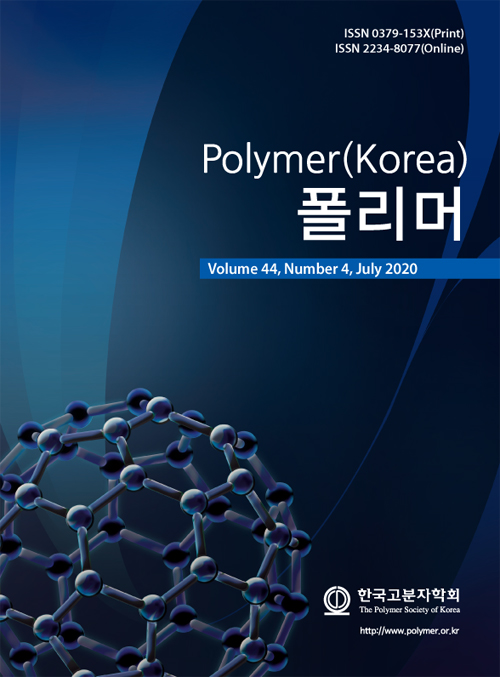- Thermal Conductivity Studies on Electrically Insulating Polymer Composites in Relation to Mechanical Properties
Namil Kim†
 , Jun-Young Park, Dae-Keun Kim*, Moon-Young Lee*, Chang-Min Hong*, Seok-Hu Bae, Jeong-Hwan Yoon, and Ju-Ho Yun
, Jun-Young Park, Dae-Keun Kim*, Moon-Young Lee*, Chang-Min Hong*, Seok-Hu Bae, Jeong-Hwan Yoon, and Ju-Ho YunKorea Automotive Technology Institute, 303 Pungse-ro, Pungse-myeon, Dongnam-gu, Cheonan-si, Chungnam 31214, Korea
*Cepla, 62-38 Gwandeaan-gil, Dunpo-myeon, Asan-si, Chungnam 31411, Korea- 전기 절연형 고분자 복합재의 열전도도와 기계적 특성 상관성 연구
한국자동차연구원 첨단소재연구센터, *㈜세프라 기술연구소
Various polymer composites consisting
of different polymers and ceramic particles were prepared and then thermal
conductivity was investigated in relation to mechanical properties. Thermal
conductivity of the composites increased with an increase of the ceramic
loading. In addition, the use of polymer with high crystallinity and larger
particles was more efficient to enhance thermal conductivity. The mechanical
properties such as tensile strength, flexural strength, and impact strength
gradually decreased as the ceramic content increased. It is realized that the
selection of appropriate materials and their combination is prerequisite to
adjust the thermal conductivity and mechanical properties of polymer composites.
다양한 고분자 매트릭스와 세라믹 필러의 조합을 통하여 전기
절연형 열전도성 복합재를 제조한 뒤 열전도성과 기계적 특성에 대해 알아보았다. 세라믹 필러의 함량에
비례하여 복합재의 열전도도는 상승하였고 동일한 함량에서 매트릭스의 결정화도가 높거나 필러의 크기가 클수록
상대적으로 높은 열전도도를 보였다. 인장강도, 굴곡강도, 충격강도를 포함한 기계적 강도는 필러의 함량이 증가할수록 전반적으로 감소하는 경향을 보였다. 열전도도 측면에서는 입자의 크기가 크고 함량을 높이는 것이 유리하지만 무게의 증가와 기계적 강도 저하를 수반하기
때문에 열전도도와 기계적 특성을 고려한 재료의 선정과 배합비에 대한 최적화가 필요할 것으로 보인다.
Keywords: ceramic fillers, impact strength, polymer composites, tensile strength, thermal conductivity
- Polymer(Korea) 폴리머
- Frequency : Bimonthly(odd)
ISSN 0379-153X(Print)
ISSN 2234-8077(Online)
Abbr. Polym. Korea - 2023 Impact Factor : 0.4
- Indexed in SCIE
 This Article
This Article
-
2020; 44(4): 559-565
Published online Jul 25, 2020
- 10.7317/pk.2020.44.4.559
- Received on Mar 27, 2020
- Revised on Apr 16, 2020
- Accepted on Apr 22, 2020
 Correspondence to
Correspondence to
- Namil Kim
-
Korea Automotive Technology Institute, 303 Pungse-ro, Pungse-myeon, Dongnam-gu, Cheonan-si, Chungnam 31214, Korea
- E-mail: nikim@katech.re.kr









 Copyright(c) The Polymer Society of Korea. All right reserved.
Copyright(c) The Polymer Society of Korea. All right reserved.